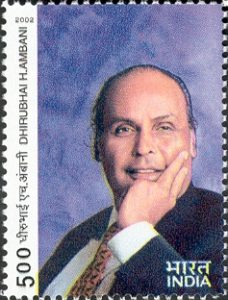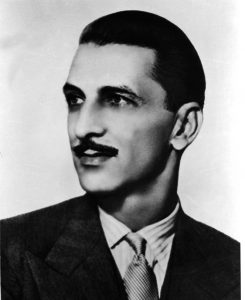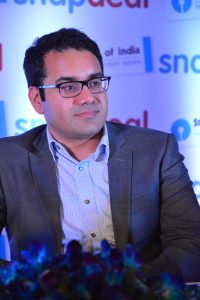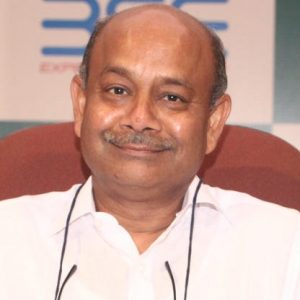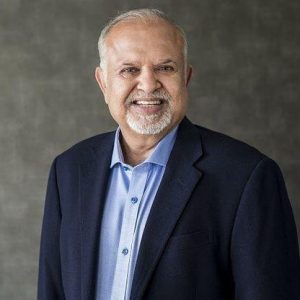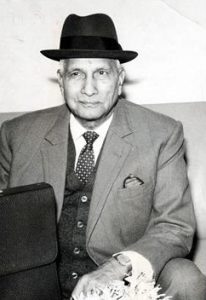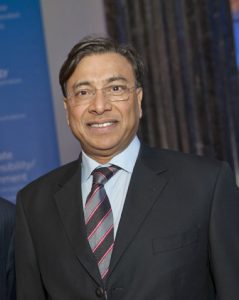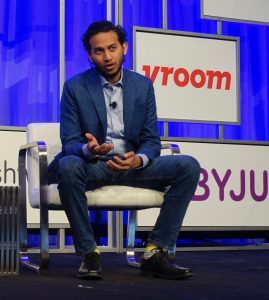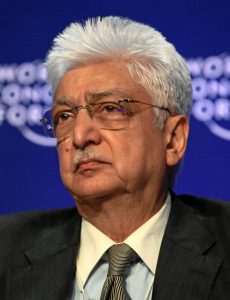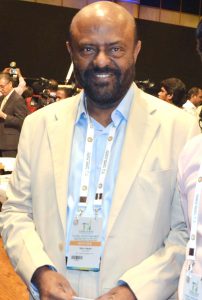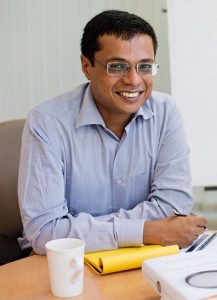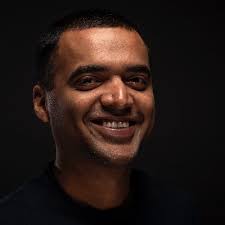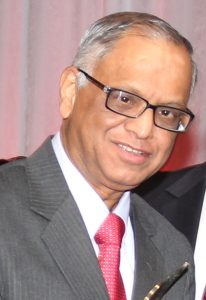15 Famous Indian Entrepreneurs And Their Inspiring Stories!
Starting a business is no mean feat. More so when you do not come from money. For most of 20th century, India was struggling financially: be it because of the British rule or the aftermath of a number of wars. But that did not deter these famous Indian entrepreneurs who fought to make their ideas a reality. Of course, some of the people on the list already belonged to well-off families, however these people made it here because they turned around pre-existing family businesses into something else entirely; the rest of the entries are people who are largely self-made.
1. Dhirubhai Ambani
Born in Chorwad in Junagadh district, Dhirubhai Ambani was one of the biggest names in business in India for a long time. Born to a village school teacher, friends and relatives remember him as terribly ambitious and an unafraid risk-taker. Ambani moved to Yemen at the age of 16, where he sold oil products. His sons, Mukesh and Anil, were born during this time in Yemen. However, Dhirubhai Ambani soon made his way back to India, wanting to start a business of his own. He started a textile business with his second cousin, Champaklal Damani. The two soon parted ways, however, because of different temperaments and attitudes. In 1966 Ambani founded Reliance Commercial Corporation, which later became Reliance industries in 1973. Sometime around this early stage, he launched the brand “Vimal” which sold polyester material for sarees, shawls, dresses etc. Vimal soon became a household name, and a favourite among buyers. Reliance soon expanded to other industries, including telecom and petrochemical. By the time of his death in 2002, Reliance Industries had become one of the leading companies in India by market capitalisation.
Source: Wikimedia Commons
2. J R D Tata
Born in an affluent Parsi family to renowned businessman Ratanji Dadabhoy Tata, and a French mother, Suzanne Briere, Jehangir Ratanji Dadabhoy Tata was one of the most important Indian businessmen of the 20th century. He spent most of his earlier years in France and England, and only renounced his French citizenship in 1929 to become an Indian citizen. He joined Tata Sons as an unpaid apprentice in 1925, and through the years became a favourite at the company. In 1938 at the age of 34, he made Chairman, making him the head of one of the largest companies in India. Under his leadership, Tata Sons entered a number of new avenues. J R D Tata himself was the first licensed pilot in India, and is often called the father of Indian civil aviation. He founded Tata Airlines in 1932, which later became Air India. In 1945, he founded Tata Motors, in 1954, Voltas, in 1968, Tata Consultancy Services (TCS), in 1983, Tata Salt, and in 1987, Titan Industries. He was known for his ethically clean practices and non-engagement in corruption. He was awarded the highest civilian honour in India, the Bharat Ratna, in 1992.
Source: Wikimedia Commons
3. Kunal Bahl
Born and brought up in Delhi, Kunal Bahl is an Indian entrepreneur and investor who co-founded the Indian e-commerce platform, Snapdeal along with his friend from school, Rohit Bansal. While Bahl earned a degree in management from The Wharton School, Bansal had a BTech from IIT Delhi. The duo started Snapdeal as a daily deals platform in 2010, but later expanded it to make it a full fledged e-commerce company in 2011. Soon, Snapdeal became one of the leading online marketplaces in India, and despite tough competition from rivals Flipkart and Amazon, and almost shutting down at one point in time, Snapdeal has stayed afloat still.
Source: Wikimedia Commons
4. Radhakrishan Damani
Born in a lower-middle class Marwari family in Mumbai, Radhakishan Damani is an Indian businessman best known for being the founder of DMart. Damani initially had a ball bearing business, which he left after the death of his father. Damani’s father worked at Dalal Street. After his death, Damani too began working as a stock broker and investor. He made super profits in the 90s, thanks to Harshad Mehta, who’d inflate stocks by illegal means. Damani acquired a notable sum of money during this period, and quit the stock market in 2000. He opened the first DMart in Powai in 2002, and by 2010 the chain had 25 stores. There are currently over 230 DMart stores, and in 2020, Radhakishan Damani was the 4th richest person in India.
Source: Forbes
5. Mukesh Jagtiani
Also known as “Micky” Jagtiani, Mukesh Jagtiani is an Indian businessman of Sindhi heritage based in the UAE. Jagtiani was born in Kuwait. He took over his brother’s shop after the latter had died, and turned it into a baby products shop. In 10 years, he had expanded to 6 stores. However, as luck would have it, the Gulf War struck in the 90s, and he had to move to Dubai. In Dubai, Jagtiani founded the Landmark Group, which eventually expanded to a variety of niches, including fashion, electronics, furniture, and hotels. The Landmark Group employs over 45000 people in India, Middle East, and the Persian Gulf region. In 2008, Jagtiani made it to Forbes List of billionaires, and had a net worth of $3 Billion as of May 2021.
Source: Forbes
6. Dilip Shangvi
Born in the small town of Amreli in Gujarat, Dilip Shanghvi spent most of his early years in Calcutta, and earned a bachelor’s degree in commerce from the University of Calcutta. His father had a wholesale generic drug business in Kolkata, and Shanghvi began his career by working for his father. During this time, he thought of manufacturing his own drugs, and founded the Sun Pharmaceutical Industries with only Rs 10,000 in 1982 (~ Rs 1,75,000+ in 2021). In the beginning, he only manufactured five psychiatry drugs, but eventually expanded to make cardiology and gastroenterology products by the 90s. In 1997, Sun acquired Caraco Pharma, an American company, and in 2007, Taro Pharma, an Israeli company. In 2014, Sun acquired Ranbaxy, to become the largest pharmaceutical company in India. Shanghvi was the 14th richest person in India as of October 2021 with a net worth of over $14 Billion.
Source: Wikimedia Commons
7. Ghanshyam Das Birla
Born in the already well-off Merchant family of Birlas, G. D. Birla arguably became one of the most important members of the family, eventually founding various important companies and institutions that still represent his legacy. Birla’s family was one of the earliest cotton traders in India, and the family also traded Opium with China. G. D. Birla started his career as a Jute broker and established the Birla Jute Mills in 1918. Birla had to fight tooth and nail against the British government, that favoured the European merchants. However, during the first world war when business plummeted for European traders, Birla’s profits skyrocketed. In 1940s, Birla established Hindustan Motors. After the Quit India Movement in 1942, Birla thought of organizing a commercial bank with Indian capital, and thus United Commercial Bank was formed, which later became UCO Bank. Birla also founded BITS at his native place of Pilani, which is now one of the most sought after institutes of education in India. He also founded the Technologic Institute of Textile & Sciences in Bhiwani.
Source: Wikimedia Commons
8. Lakshmi Mittal
Born in a Marwadi family, Lakshmi Mittal’s father, Mohanlal Mittal, ran a steel business, Nippon Denro Ispat. Due to the curb on steel production in India, Lakshmi Mittal opened his first steel factory in Indonesia in 1978, naming it Ispat International, as part of his father’s Ispat Industries. However, by mid 90s Lakshmi separated it from his father’s company due to various disagreements within the family. Mittal acquired state-owned steel works in Trinidad and Tobago in 1989, and continued to acquire several assets over the next two decades, with the biggest one being the takeover of Arcelor in 2006, following which he renamed it to ArcelorMittal. Currently, ArcelorMittal is the second biggest steel producer in the world.
Source: Wikimedia Commons
9. Ritesh Agrawal
Born and brought up in Odisha, Ritesh Agarwal was born in a family of modest means. Ritesh dropped out of college but was selected for the Thiel Fellowship in 2013. He started a budget accomodation portal, which he launched as OYO Rooms in 2013 after receiving a grant of $100,000 as a winner of the Thiel Fellowship Program. By September 2018, Agarwal had raised $1 Billion in funding, and by 2019, he had bought shares worth $2 Billion in OYO, tripling his stake. Ritesh Agarwal is the second youngest self-made billionaire after Kylie Jenner.
Source: Wikimedia Commons
10 Azim Premji
Born in a well established Gujarati Muslim business family, Azim Premji is an Indian entrepreneur and philanthropist. In 1966, Premji had to travel back home from Stanford University, where he was studying engineering, when he was told of his father’s death. Upon returning to India, Premji took over Wipro, which was called Western Indian Vegetable Products back then. The company dealt in hydrogenated oil, but Azim Premji diversified the company to other fields including soaps and toiletries, lighting products, hydraulic cylinders, etc. Taking advantage of the IT boom in India, Premji renamed the company to Wipro, and entered the tech sector by manufacturing microcomputers. In 2001, he founded the Azim Premji Foundation, a non-profit organization. The foundation has worked tirelessly over the last two decades to improve education in India, and in 2010 Premji pledged to donate $2 Billion for the same. It was the highest donation ever made in India for education.
Source: Wikimedia Commons
11. Shiv Nadar
Born in Moolaipozhi village near Tiruchendur in Madras Presidency (present-day Tamil Nadu), Shiv Nadar is an Indian billionaire entrepreneur. He began his career with Walchand Group’s Cooper Engineering Ltd. but soon left to begin his own venture. He eventually founded Microcomp with various colleagues and friends; Microcomp focused on selling teledigital calculators in India. He then founded HCL in 1976 with an investment of Rs 1,87,000. In 1980, the company went international, opening Far East Computers in Singapore. In the first year itself, the venture reported a revenue of Rs 1 Million. In 1996, Nadar founded SSN College of Engineering in Chennai. In 2020, he handed over the reins of the company to his daughter, Roshni Nadar, who became the first female chairman of a listed IT Company in India.
Source: Wikimedia Commons
12. Falguni Nayar
Born in Mumbai, Falguni Nayar graduated from Sydenham College of Commerce and Economics and then earned her postgraduate degree from IIM Ahmedabad. She began her career as a consultant in 1985, when she worked as a consultant in the management consulting company, A F Ferguson & Co. She joined Kotak Mahindra Group in 1993, and remained in the company for 19 years, serving as the Managing Director from 2005 until 2012, when she exited the company. The same year, at the age of 50, Falguni Nayar founded Nykaa, which was worth $2.3 Billion as of 2021, bringing Nayar’s net worth close to $1.1 Billion. Nykaa is a leading e-commerce website in India, beating both Amazon and Flipkart in the health and beauty segment.
Source: Twitter
13. Sachin Bansal
Born in Chandigarh, Sachin Bansal graduated from IIT Delhi, and briefly worked with Amazon before starting his own e-commerce platform. Like Amazon, he started Flipkart as an online bookstore as well. Sachin Bansal and his co-founder, Binny Bansal at first operated their start-up from an apartment in Bangalore. Sachin held the position of CEO from the inception of Flipkart until 2016, and then was the executive chairman from 2016 to 2018. In 2018, Bansal sold his shares to Walmart and made his exit. Post his Flipkart exit, Bansal has invested in various businesses, including a $100 million in Ola Cabs. He founded a financial services company, Navi, with Ankit Agrawal in 2018.
Source: Wikimedia Commons
14. Deepinder Goyal
Born in Chandigarh, Deepinder Goyal is an Indian entrepreneur who is the founder of popular online food-delivery service, Zomato. Goyal graduated with a BTech from IIT Delhi, and briefly worked for Bain & Company. Goyal had always been interested in opening a food and services business, and thus started Foodiebay, which he later renamed to Zomato. Over the years, Zomato garnered much support from users as well as investors, becoming a unicorn company in 2020. As of 2021, Goyal’s net worth stands at $650 million.
Source: Twitter
15. N R Narayanamurthy
Born in Sidlaghatta in the Kingdom of Mysore (present-day Karnataka), N R Narayanamurthy was born in a middle-class Kannadiga family. He graduated from National Institute of Engineering with a BTech in electrical engineering, and then earned his master’s from IIT Kanpur in 1969. He began his career by serving as a research associate at IIM Ahmedabad, and later became the Chief Systems Programmer. During this time he worked on India’s first time-sharing computer system. Although Narayanamurthy considered himself a leftist until then, a traumatic event in a communist country changed his point of view, turning him into a “compassionate capitalist.” He founded a company named Softronics, but it failed and he had to take up a job in Patni Computer Systems in Pune. In 1981, he founded Infosys with a capital of Rs 10,000. He served as the CEO of Infosys for 21 years from 1981 to 2002. His co-founder, Nandan Nilekani, succeeded him.
Source: Wikimedia Commons
Did you like our list of famous Indian entrepreneurs? Comment below if you think we forgot someone worthy of a mention!


